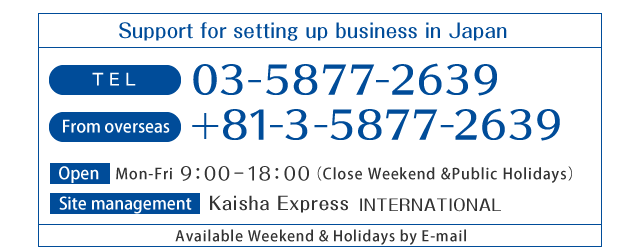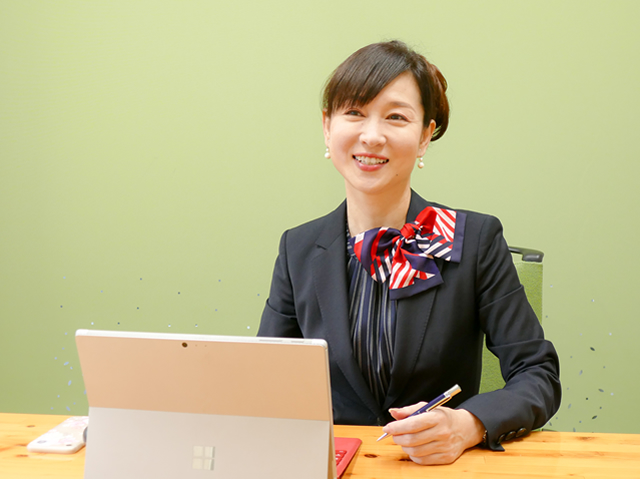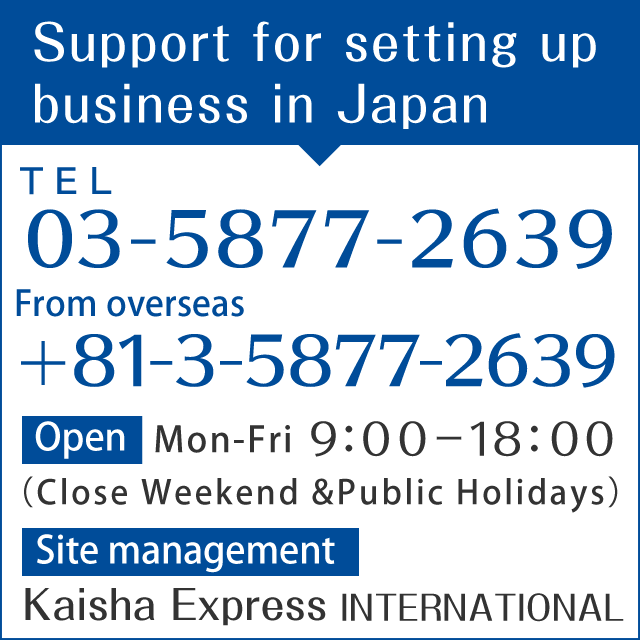Incorporation
How long does it take between consultation and setting up business?
The duration to establishment will depend on whether or not you have the necessary documents such as certificate of signature.
Many cases require one to two months from consultation. Foreign nationals residing in Japan, who can readily obtain a company seal impression certificate, may be able to set up business in one week. We work with a certified administrative procedures legal specialist corporation for quick, smooth establishment.
I live abroad. Can I set up business in Japan?
Yes, you can. Regulations have been revised so that a company may be established even if the representative director does not have an address in Japan.
However, the account to which you remit capital must be at a financial institution established with authorization from the Japanese Financial Services Agency. This may be a bank in your home country with a branch office in Japan. We can recommend a bank we work with regularly, or provide nominee services involving the appointment of a temporary representative director. Please consult us about the latter service, as it comes with several conditions.
Can I complete registration of incorporation in Japan using a virtual office as the head office address?
Registration of incorporation may be completed with any address. Using a virtual office as your head office address, in itself, does not present a problem.
However, the securing of a physical office space will be a requirement after establishment, for instance if you wish to apply for a business manager visa or invite foreign employees from the parent company abroad to work in Japan.
Certain operations that require permits and licenses also may not accept a virtual office as an address. Please consult us if this applies to you.
When setting up a subsidiary, can I register the trade name in Roman alphabet, to match the parent company in the home country?
Yes, you can. Numerals, hyphens, commas, bullet points, and other symbols are also acceptable in the trade name of a subsidiary. Note, however, that “Kabushiki Kaisha” must appear before, in, or after the trade name.
Must everyone setting up business in Japan always make a company seal?
Yes, making a company seal is a requirement before applying for registration of incorporation. Our services include a three-item package of representative’s seal, bank seal, and square company seal.
Should I establish a subsidiary or a branch office?
This would depend on the purpose of your business activities in Japan. Please contact us for a consultation, and we will recommend the best type of operation for you.
Note that a branch office does not require capital and thus involves fewer expenses at the time of establishment. Taxes will be high, however, if the parent company in the home country has a large capital.
Should I establish a Kabushiki Kaisha (joint stock company) or a Godo Kaisha (limited liability company)? I plan to set up business in Japan and obtain a business manager visa.
As far as obtaining a business manager visa is concerned, neither is better or worse than the other. We recommend Kabushiki Kaisha if you are considering going public in future, and separating shareholders from management.
Godo Kaisha offers advantages for smaller operations such as sole proprietorships, as it involves fewer expenses at the time of establishment, and the articles of incorporation may be amended at will.
I like the number “8(eight)”, so is it possible to establish a company by having ¥88 as our capital?
By the Japanese Cooperate Law, there are no limits in how much you maintain as your capital, so it is possible for you to establish a company from ¥1. However, by establishing a company that way, the credibility of that company will be low. There is a chance that the company could maintain the credibility by the original techniques and experiences but if the capital amount is extremely low, it will be hard to open a cooperate account. It is recommended to set your capital amount enough to keep your business going from the starting point up to 6 months.
Is there a legal obligation to keep the Articles of Incorporation?
The Japanese Companies Act (Article 31) requires that the Articles of Incorporation be kept at the registered head office or branch office of the company after incorporation.
Please tell me about the Director’s obligation and responsibility by the Japanese Corporate Law.
The most important responsibility that the Director owe is called “Zenkan Chu-I gimu” meaning a “Duty of Care.” By being a professional at managing a business and running the business, it is required to take responsible for the fiducial duty towards to the shareholders, staffs, and the public in general. There are rules that restricts for the Directors to come in conflict against its own company, but in reality, Directors that has a contract with the company has their own discretion among managing the business.
There are three Directors. If one of the Director acts over the rights, what are the responsibility towards that Director’s act?
If there is any loss toward the third party, it is the Director’s responsibility to compensate the loss. For example, if Director A takes away the creditor’s money, the director’s are responsible for that loss.
There are three directors. If there is any loss caused by act of one of the directors, does the other director’s that was not involved in the act has to take responsible for that loss. If so, what kind of responsible is there to take?
The director that caused the loss must take responsibility. Other directors that were not involved in the act would not have to take responsibility if there was no serious negligence to that act.
However, if for example Director A has taken away money and Director B had a chance to find out about A’s act, B has a serious negligence toward not stopping A’s act and will need to take responsible for that loss. So, it becomes a joint liability between A and B. In other word, if you are doing your duty in integrity, that you won’t have to take responsibility for the other’s act.
I’m thinking of renting a property with a three-month contract with an automatic renewal for my business management visa. Will that be a problem?
A three-month contract is too short. Even if the contract is automatically renewed every month, the Immigration Bureau may judge that the business is not sustainable. For this reason, we recommend a contract of at least one year.
Can a stock company be a representative member of a limited liability company?
You can do it. However, it is necessary to appoint a person to perform the work on behalf of the legal entity. That person is called a Person of Performance of Duty.
A foreign company plans to establish a Japanese subsidiary. Can a non-resident director of Japan receive director’s remuneration from the Japanese subsidiary? Is it impossible to receive director’s remuneration unless they reside in Japan with a “Business manager” status of residence?
A non-resident director can receive director’s remuneration, even if they do not have a “Business manager” status of residence in Japan.
Who can be appointed as Person of Performance of Duty (an executive member) of a Godo Kaisha?
If a foreign company is an executive member, an executor member has to be appointed due to Article 598 of the Companies Act. The person who performs duties does not necessarily have to be the partner of the corporation. An employee of the corporation or a third party can also be appointed. For example, there is no problem in appointing an outside specialist such as an accountant or management consultant who is an advisor to the corporation as an executor. In this case, the specific legal relationship between the legal entity and the executor is determined by the contract concluded between the legal entity and the executor.
Please tell me about the measure for non-display of the address of representative directors, etc.
The “measure for non-display of the address of representative directors, etc.,” which came into effect on October 1, 2024, is a new system that allows the non-display of the address of representative directors, etc., in commercial registration. This system was established by partial amendment of the Commercial Registration Regulations (Ministry of Justice Ordinance No. 28 of 2024), and is intended to protect the privacy and security of business-related persons in particular. The background of this system is the increasing risk of misuse of personal information of business-related persons and concerns about security, especially with the increasing ease of information disclosure on the Internet. The purpose of this system is to prevent the leakage and misuse of personal information of executives and others, and to create a safer environment in which corporate activities can be conducted.
Visa
Must a foreign national setting up business in Japan always obtain a visa?
No, a visa is not an absolute requirement. Some foreign nationals run their business from abroad, and visit Japan only several times a year on a tourist visa. If you wish to operate in Japan over an extended period of time, however, you must apply for a visa.
What is the system of human resources for future creation (J-Find) introduced in April 2023?
Graduates of outstanding overseas universities, etc. who are engaged in ’employment activities’ or ‘preparatory activities for starting a business’ in Japan are granted the status of residence ‘specified activities’ (future creative human resources), which allows them to stay in Japan for up to two years.
The following three conditions must be met by eligible applicants.
(i) Graduated from a university ranked in the top 100 in two or more of the three world university rankings, or completed a postgraduate course at a university and received a degree or professional degree.
(ii) Within five years of graduation.
(iii) Possession of 200,000 yen worth of living expenses at the beginning of their stay.
If you fulfil these conditions, you will be granted the status of residence “specified activities” for a maximum of two years, which allows you to prepare for entrepreneurship and job-hunting activities as well as to work part-time or other employment. This allows them to change direction, for example, from preparing to start a business to working for a company as it is more suitable for them. For young people, who are the future, a residence status that allows them to explore their options while still in Japan is very attractive.
I was granted a 1-year residence status for “Business Manager” and entered Japan. It has been six months since I entered Japan, but I am often overseas and have not yet registered my address in Japan. Will this cause any problems?
If you do not register your address within 90 days of being granted entry, it may result in the cancellation of your residence status. *Except there are justifiable reasons for not notifying.
I have a 3-year visa for “Technical Humanities Knowledge International Business” and I am eligible for the relaxation of permanent residency requirements. I checked and it seems that I have been maintaining 80 points for the past year. Is it possible to apply for permanent residency?
Yes, you are eligible to apply for permanent residence because you have a score of 80 or higher as defined by the Ministerial Ordinance on Highly Specialized Professions as of one year prior to the date of application for permanent residence, and has been continuously residing in Japan for at least one year with a score of 80 or higher. However, it is possible that your own point calculation is incorrect, so please consult with our administrative scrivener who specializes in this area.
I am currently attending graduate school by correspondence while working for a Japanese company under the status of residence of “Engineer/Humanities/International Services”. I plan to graduate from the graduate school in two years, at which time I would like to change my status of residence to “Highly Specialist 1(b)”. In this case, can I count “work experience” (work experience related to the work I intend to engage in) as “more than 10 years” (20 points)?
Currently, periods of overlapping work experience and academic work cannot be double-assessed. In this case, the period of graduate study cannot be included in the number of years of work experience, and therefore, the score will be “between 7 and 10 years” (15 points).
I am interested in the Digital Nomad Visa. What are the requirements?
Digital Nomad is a new visa status that allows people working remotely across borders in fields such as IT, marketing, and consulting to stay in Japan for up to six months. The new system, which began in April 2024, is intended for those who work remotely in Japan while being compensated by an overseas company.
Three conditions are set forth.
(1) Nationals of countries or regions that are visa (visa) exempt and have tax treaties with Japan.
(2) Annual income of 10 million yen or more
(3) Must have private medical insurance
This is an attractive program for nomadic workers who would like to experience life in Japan for a few months, as spouses and children are also allowed to accompany them. Status of residence falls under “Designated Activities”. On the other hand, there are some disadvantages: a stay of more than 6 months is not allowed, activities outside the status of residence (part-time jobs in other industries) are not permitted, a residence card is not issued, and employment contracts with Japanese companies cannot be concluded.
What is the expiration date of my residence card?
Apart from the period of stay, the residence card itself has an expiration date. The validity period of the residence card for mid- to long-term residents other than permanent residents is until the expiration date of the person’s own period of stay. However, those who are (1) under 16 years old, (2) holders of Special Permanent Resident Certificate, or (3) holders of Highly Skilled Professional (ii) need to pay attention to the renewal period.
The validity period of the residence card is 7 years from the date of issue for those who have the status of “Permanent Resident” (limited to those who are 16 years old or older) or ” Highly Skilled Professional (ii) “. For those other than “Permanent Resident” (limited to those 16 years of age or older) or ” Highly Skilled Professional (ii) “, the period of stay will be until the expiration date of the period of stay.
For permanent residents under 16 years of age, the expiration date of their residence card is their 16th birthday *, and they must apply for renewal of their residence card before that date.
For non-permanent residents under 16 years of age, the expiration date of the residence card is the expiration date of the period of stay or the 16th birthday, whichever comes first. And if the 16th birthday comes first, the residence card renewal application must be made before that date**.
*The validity period of the residence card issued on or after November 1, 2023 will expire on the day before the 16th birthday.
**The validity period of the residence card issued on or after November 1, 2023 will expire on the day before the expiration date of the period of stay or the day before the 16th birthday, whichever comes first. In this case, the applicant must apply for renewal of the residence card before applying for permission for extension of the period of stay.
If you are under 16 years of age, the application for renewal of the validity period must be made by a proxy such as a relative living with you (you are not obliged to apply on the day of your 16th birthday either).
I am an international student. I am considering applying for the Tokyo Metropolitan Government’s project to promote the acceptance of foreign entrepreneurial talent (Tokyo Startup). When is the best time to apply?
According to the guidelines published on the web, it does not matter when you apply as long as it is during your status of residence ” Student”. However, in actual operation as of July 2024, it is required that the period of stay be at least 3 months at the time of application, perhaps in anticipation of the time required for screening. If your period of stay expires while you are in the process of applying for a Tokyo Start-up visa, you will need to (1) return to your home country and wait for the results, or (2) find a new school, etc. and apply for renewal so that you can continue to maintain your “Student” status in Japan. It is important to take action as soon as possible.
My application for change of status of residence was denied. Can I apply again? What should I do to obtain permission
First, go to the immigration office to ask the reason for the denial. They will be able to give you specific advice as to what points were the cause of the denial and how to improve conditions in order to be approved. In some cases, you may not be able to reapply.
However, the examiner can only hear the reasons for denial once, in person, “when the applicant personally appears before the examiner”. If “the applicant allows to reapply”, there is a deadline to prepare for departure, the applicant must improve the situation and gather the necessary documents and reapply within the time limit.
We can accompany you to the immigration office and assist you in reapplying, depending on the details of your application. Please consult with us before you go to hear the reason for non-approval.
When applying for “Technical/Humanities/International Knowledge” status of residence, “proof of education” may be required. How can I check higher education in a foreign country?
It is possible to find out where a degree earned in a foreign country corresponds to the Japanese school system from the web of the Ministry of Education, Culture, Sports, Science and Technology (MEXT) (link to school systems around the world: https://www.mext.go.jp/b_menu/shuppan/sonota/detail/1396836.htm). Junior college and vocational school diplomas are generally limited to Japanese schools. For example, the French Diplôme DUT, which recognizes completion of two years of higher education after obtaining a baccalauréat (high school diploma) in France, is considered equivalent to a junior college in Japan. In some cases, certification by the MEXT is required, and in other cases, the content of the major and the activities are required to be related, so please consult with us if you are unsure about the decision.
Can a foreigner who has not yet lived in Japan obtain the status of “Permanent Resident”?
As a general rule, you are required to have been continuously residing in Japan for at least 10 years, of which at least 5 years must have been spent in Japan with employment status. In addition, depending on the status of residence, the period of stay before applying for permanent residence may exceptionally differ. However, they do not differ in that an application for permission to change status of residence is filed after a certain period of stay based on the status of residence has elapsed. Therefore, it is not possible to apply while staying in a foreign country, as is the case with other status of residence.
I would like to apply for the ” Highly skilled professional 1 (a, b, or c)”. I receive compensation from an overseas company. Is this compensation included in the point calculation?
This is a case-by-case basis, but if the applicant is transferred from a foreign parent company to a Japanese company, and compensation is also received from the foreign company, the said compensation will be included in the compensation in the points calculation. When applying for a visa, it is necessary to prove the relationship between the “head office and the Japanese company/both companies,” the applicant’s position at the head office and the Japanese company, and the amount of remuneration.
I changed my last name after marriage, so my name on my diploma and passport are different. Will that be any problem?
You will need to submit a document that shows the connection between your maiden name and your current name, such as a marriage certificate.
When applying for status of residence under Tokyo’s “Program to increase foreign entrepreneurs,” how long does it take to obtain an entry permit into Japan?
It will take one to three months after submitting your three-year business plan to Tokyo. Note, however, that the screening period varies on a case-by-case basis.
Under ordinary regulations, foreign nationals wishing to set up business in Tokyo must first establish the business, then apply for a business manager visa, and wait for three to six months during screening to receive an entry permit into Japan. This entails a loss: if you rent an office at the time of establishment, you would need to continue paying rent until you receive the entry permit.
We recommend the Tokyo Metropolitan Government’s new program because it allows you to first enter into Japan, and then make preparations for setting up business with support from the Tokyo government.
We provide support by completing all procedures on your behalf, from preparation of the three-year business plan for Tokyo to application with the Immigration Bureau.
Simply leave everything to us, as we are well acquainted with application procedures under Tokyo’s “Program to increase foreign entrepreneurs.”
Is it possible for a foreigner who entered using the system of the Tokyo Start-up visa to apply for permission to change his/her status to ‘Highly Specialised Worker (No. 1 (c))’ instead of applying for permission to renew the period after six months of Tokyo start-up activities?
Yes, it is possible.
If the applicant fulfils the conditions, it is possible to apply for permission to change status to ‘highly specialised profession (No. 1(c)’.
It is possible to check whether the conditions have been fulfilled using the points calculation table and the website of the Immigration Beaurow.
However, there are many cases where a self-made point calculation has shown that you do not fall under the category of highly specialised professional. You can smoothly change your status of residence by requesting a specialised administrative lawyer.
When an applicant for the Tokyo Metropolitan Government’s project to promote the acceptance of foreign start-up workers (Tokyo Start-up, Program to increase foreign entrepreneurs) arrives in Japan, his/her status of residence is “Management” and his/her period of stay is 6 months. Can they open a personal account?
It is possible. Recently, an increasing number of banks allow you to open an account with the same functions as a resident with a “Certificate of Confirmation of Business Startup Activities”. However, each bank and branch may differ in their response, so it is recommended that you inquire and confirm before applying to open an account. In addition, it is recommended that you be accompanied by a Japanese-speaking person to ensure smooth procedures.
If a “Certificate of Eligibility” for “Management/Administration” under the Tokyo Metropolitan Government’s project to promote the acceptance of foreign business personnel is issued to me while I am in Japan for a short-term stay, can I apply for a change of status of residence?
In principle, it is not possible. This is because the Tokyo Metropolitan Government’s program to promote the acceptance of foreign business start-up personnel targets “new foreign nationals entering Japan” with the exception of foreign students. The Tokyo Metropolitan Government emphasizes that it is essential for foreign nationals to return to their home country and then re-enter Japan with “business/administrative” status of residence.
My number card will expire while I am waiting for the result of my application for extension of stay, what should I do?
By following the procedures below, you can extend your validity period by 2 months, called “Special Extension”.
(1) If you apply for extension of status of residence at the counter, bring your My Number Card and have it stamped with a “Special Extension” stamp.
If you apply for extension of status of residence online, please bring the “notification e-mail” of the application receipt number sent by the Immigration Bureau after application and your “current resident card” to the my number card application counter of the nearest city/ward office to complete the “special extension” procedure.
In either case, if you bring your new residence card to the My Number Card counter within the special extension period, you can renew your card free of charge. After the special extension period, reissue of the card will be charged.
If I apply for a Tokyo Startup Visa and am rejected, can I reapply?
In principle, you cannot reapply with the same business content. If you wish to reapply to Tokyo, you will need to prepare a completely new business plan with different business content. Depending on the type of business, it may also be possible to apply for a startup visa in a prefecture other than Tokyo.
I have been in Japan on a dependent visa, graduated from an international school and am looking for a job in Japan. What should I know about changing my visa status to 'Designated Activities'?
Most cases require documents like a letter of offer or employment contract. The work conditions must meet The Immigration’s criteria, such as salary, contract period and working hours. So please check with your employer. The documents you need depend on your situation. For example, you might need to show that your international school is the equivalent of a Japanese high school or that you have a certain level of Japanese.
Can I apply for a visa extension as a freelancer in the “Engineer/Specialist in Humanities/International Services” category?
Even if you are not employed by a company, it is possible to renew your visa as a freelancer if you are working in a job that makes use of your expertise in technology. However, in this case, you must carry out your work “based on a contract with a public or private organization in Japan”. In other words, you must be contracted or commissioned to carry out some kind of work with a corporation or other organization in Japan. When applying for a visa extension, your monthly income and the details of your contract will be very important.
What are the differences between the Kanagawa Prefecture and Tokyo Startup Visas?
The main differences are that the business type is specified and, in some cases, corporate investment can be used instead of personal investment (although this is more difficult). The screening process is also different. As it is on a case-by-case basis, we recommend that you do your research carefully.
Corporate bank account
I failed the screening process for opening a corporate bank account. Can I use my personal bank account as a business account?
The use of a personal bank account for corporate transactions is not prohibited by law. However, if an account used for personal living expenses is used for business payments, the bank may suspect that the account is being misused. Frequent use of personal accounts for corporate transactions has resulted in accounts being frozen in reality. We recommend that you open a corporate account for the safety of your transactions.
Is it possible to open a corporate bank account with a capital of only 1 yen?
While the Companies Act does not impose any restrictions on the amount of capital, it is possible to establish a company with a capital of 1 yen. However, during the screening process for opening a bank account, a capital of 1 yen may raise doubts about the company’s commitment to the business and lead to suspicions of it being a shell company. In reality, very few companies have successfully opened bank accounts with a capital of only 1 yen. Therefore, it is advisable to have a capital of around 2 million yen when opening a corporate bank account.
Is it possible to open a corporate bank account using a virtual office?
Yes, it is possible to open a corporate bank account using a virtual office. However, due to cases of virtual offices being used for fraudulent activities, the screening process for opening corporate bank accounts has become increasingly stringent in recent years. Based on our experience, we have found that it is possible to open an account if the company have real business activities and a representative who can be contacted in Japanese and resides in Japan. Additionally, online banks are generally more accommodating to opening accounts than banks with physical branches.
Are there any online banks that allow for both sending and receiving international transfers?
Some banks allow both international remittances and receipts. Some banks require a separate procedure for international remittances. Other banks only handle domestic transactions. Some banks that are popular for their convenience may only accept domestic payments, so you need to check before applying.
We are planning to do businesses with companies in foreign countries, so we need to set up a company and need a corporate bank account that allows us to send money overseas. What points should I pay attention to?
First of all, you need to establish a company. However, even from the company establishment stage, you need to make systematic preparations to meet the necessary criteria for opening a bank account. Also, if you need to receive or send money from overseas, please note that some banks do not handle such services. Our firm can provide support from the establishment of a company to the opening of a corporate account, so please do not hesitate to contact us.













